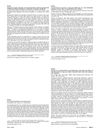1 citations,
March 2022 in “Irish Journal of Medical Science” Men with androgenetic alopecia and hypertension may experience more severe COVID-19.
 1 citations,
July 2017 in “Clinical research in dermatology”
1 citations,
July 2017 in “Clinical research in dermatology” Hair loss, known as Androgenetic Alopecia, is often caused by hormones and can be diagnosed using noninvasive techniques. Treatments include topical minoxidil and oral finasteride, with new treatments being explored. There may also be a link between this type of hair loss and heart disease risk.
 1 citations,
January 2017 in “International Journal of Research in Medical Sciences”
1 citations,
January 2017 in “International Journal of Research in Medical Sciences” Men with severe hair loss are more likely to have metabolic syndrome, a condition linked to heart disease.
August 2024 in “Cosmetics” Personalized treatments for hair loss are becoming more effective by using genetic information.
 June 2024 in “Molecules/Molecules online/Molecules annual”
June 2024 in “Molecules/Molecules online/Molecules annual” Platycladus orientalis flavonoids protect balding hair from UV damage and slow hair color change.
 April 2024 in “Nigerian Postgraduate Medical Journal”
April 2024 in “Nigerian Postgraduate Medical Journal” Androgenetic alopecia is a common hair loss condition influenced by various factors and linked to psychosocial and cardiovascular issues.

Natural compounds from Chinese herbs may safely promote hair growth and treat common hair loss.
 February 2024 in “Clinical, Cosmetic and Investigational Dermatology”
February 2024 in “Clinical, Cosmetic and Investigational Dermatology” Certain fats in the blood are linked to an increased risk of male pattern baldness.
 September 2023 in “Frontiers in Medicine”
September 2023 in “Frontiers in Medicine” The scalp fat tissue of men with hair loss shows changes in gene activity that may contribute to their condition.
 September 2023 in “Clinical, Cosmetic and Investigational Dermatology”
September 2023 in “Clinical, Cosmetic and Investigational Dermatology” Higher SHBG levels are linked to less severe hair loss in women, but vitamin D levels don't seem to affect hair loss.
 January 2020 in “Turk Dermatoloji Dergisi”
January 2020 in “Turk Dermatoloji Dergisi” Men with baldness, ear creases, and hairy ears have a higher risk of heart disease.
April 2022 in “Journal of Investigative Dermatology” Androgenetic alopecia causes hair thinning due to increased androgen activity, treatable with minoxidil and finasteride.
January 2021 in “Menoufia Medical Journal” People with early-onset androgenetic alopecia may have a higher risk of heart disease due to abnormal blood lipid levels.
October 2018 in “International Journal of Research in Dermatology” People with androgenetic alopecia are more likely to have metabolic syndrome.
 16 citations,
July 2023 in “Acta biomaterialia”
16 citations,
July 2023 in “Acta biomaterialia” The study developed a new way to create hair-growing tissue that can help regenerate hair follicles and control hair growth direction.

Enterococcus faecalis delays wound healing by disrupting cell functions and creating an anti-inflammatory environment.
8 citations,
January 2019 in “International Journal of Trichology” Early diagnosis and a combination of treatments, including minoxidil and finasteride, are recommended for managing hair loss in India.
 November 2023 in “Advanced Science”
November 2023 in “Advanced Science” A specific hair protein variant increases the spread of breast cancer and is linked to worse survival rates.
 July 2024 in “Periodontology 2000”
July 2024 in “Periodontology 2000” Autologous platelet concentrates show promise in esthetic treatments but need more standardized research.

Regenerative cosmetics can improve skin and hair by reducing wrinkles, healing wounds, and promoting hair growth.
 2 citations,
June 2022 in “Molecules”
2 citations,
June 2022 in “Molecules” Connarus semidecandrus Jack extract promotes hair growth and thickness, reduces prostate cancer cell growth, and could potentially be used as a treatment for hair loss.
 5 citations,
January 2021 in “Journal of The American Academy of Dermatology”
5 citations,
January 2021 in “Journal of The American Academy of Dermatology” Low-dose oral minoxidil is an effective and safe treatment for hair loss.
 49 citations,
August 2003 in “Journal of The American Academy of Dermatology”
49 citations,
August 2003 in “Journal of The American Academy of Dermatology” Higher IGF-1 levels in hair follicles link to better finasteride results for hair loss.
 207 citations,
April 2006 in “Journal of The American Academy of Dermatology”
207 citations,
April 2006 in “Journal of The American Academy of Dermatology” Iron deficiency may be related to hair loss, but there's not enough evidence to recommend iron screening or supplements for all hair loss patients.
 19 citations,
June 2020 in “International Journal of Dermatology”
19 citations,
June 2020 in “International Journal of Dermatology” Low-dose oral minoxidil effectively treats non-scarring hair loss with some side effects like hypertrichosis and postural hypotension.
 14 citations,
December 2011 in “Archives of Dermatological Research”
14 citations,
December 2011 in “Archives of Dermatological Research” Phyto-vesicles of β-sitosterol may effectively treat hair loss.
 7 citations,
January 2017 in “Journal of cosmetology & trichology”
7 citations,
January 2017 in “Journal of cosmetology & trichology” Good nutrition is crucial for healthy hair and can help with hair loss without medication.
 January 2017 in “International journal of clinical & experimental dermatology”
January 2017 in “International journal of clinical & experimental dermatology” Eating a balanced diet with vitamins, micronutrients, and antioxidants is important for hair health and can help with hair loss.
 February 2006 in “Journal of The American Academy of Dermatology”
February 2006 in “Journal of The American Academy of Dermatology” Most patients with anal Pemphigus Vulgaris had repeated episodes but fully recovered with treatment, without long-term problems.
 June 2022 in “International journal of drug delivery technology”
June 2022 in “International journal of drug delivery technology” Convolvulus arvensis ethanolic extract can potentially promote hair growth and reduce hair loss.























